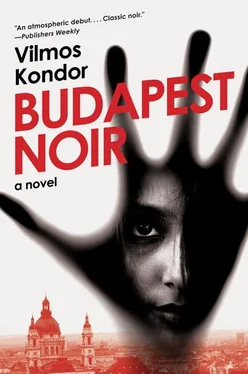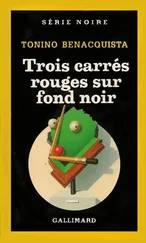“What in blazing hell happened to you?”
“An accident.”
“You were in a fight?”
“Not for fun.”
“Was it at least with a reporter at a rival paper? Over which one of you should write about the latest girl to do herself in by swallowing match heads?”
“I’ve got to rest my right hand. The doctor told me not to use it until Friday.”
From behind his desk Turcsányi took stock of him.
“I can’t type, either. And I certainly can’t write.”
The section editor slammed his red pencil on the pile of articles before him and gave a deep sigh. “Then go on home, and by Friday learn how to write with your left hand. Or to type. Or both.” He then took a typed sheet of paper from the pile and resumed reading.
Gordon went down to the archives. As usual, the door was shut. Once inside, Gordon saw that Strasser was busy putting one pack of bound newspapers after another on a pile on a desk by the wall. He was utterly immersed in the task. Sometimes he’d take the pencil from behind his ear, write a note, page through one of the packs, put the pack aside, resume searching, consult his catalog, and scratch his head. Gordon knew full well that the archivist must not be disturbed at such a time.
Naturally, even now, a cigarette hung from his mouth. Gordon sat down in the visitor’s chair and he, too, lit a cigarette. It was a couple of minutes past noon. Strasser took the packs of newspapers and returned them one after another to the shelves. Once finished, he plopped down behind his desk, read over his notes, and stared at the ceiling for quite a while. Then, all at once, he sprang up, rushing headlong to a particular shelf. Grabbing a pack of papers, he paged through them, taking the pencil from behind his ear to write something down. “I thought so,” he grumbled, then returned to his desk. Adjusting his elbow guard, he spoke.
“I’m done, Gordon.”
“Wonderful.”
The archivist set his notes down in front of himself and looked at the reporter. “You didn’t ask for this in writing, so I didn’t write down the sources. Maybe I’ll remember if it’s important, but don’t bet your life.”
“I don’t need to know when and where the articles were published, Strasser, much less by whom. Your word is enough.”
“So then,” said Strasser, craning his neck. Gordon was on pins and needles and would gladly have given Strasser a good shake to get him to start talking. But he knew it was worth waiting. He knew full well that if he’d hired a private investigator, the man would have found out ten times less in twice as much time, and he would not have kept as tight-lipped about what he was up to. “So then,” repeated the archivist, “Valiant Knight András Szőllőshegyi Szőllősy was born in Budapest in 1876. His father was already officially called Tamás Szőllősy, or more precisely, Tamás Rotenau Szőllősy. He arrived in Buda as an Ashkenazi Jew after the 1848–49 revolution and there opened a general store. Just when he converted to Christianity is hard to say exactly, but it was sometime in the late 1850s. And so he didn’t have his son christened with the foreign-sounding name Andreas, but under the Hungarian name András. His wife also took the Roman Catholic faith. Szőllősy’s father became really well-to-do when he moved his business across the river to Pest in 1867. András was the only child, so he was sent abroad for schooling. First he studied in Antwerp, then Berlin. In 1902 he returned to Budapest and immediately went to work for his father, who, however, died in 1905. A year later, in 1906, András got married; his wife’s name is Irma Petneházy. They had a daughter in 1914 who was christened Fanny. During the first two years of the Great War he traveled a lot, mainly to Africa. He was among the first to make business ties in Abyssinia. By 1919 he already had five stores in Pest, but their proceeds paled in comparison with that of his coffee imports. For a while he was the main supplier for stores in Vienna and Belgrade. It was from there that, in 1920, he entered the German market. He was deft at maneuvering his way around the touchy political situation of the time, managing to avoid the storm clouds at every turn, and before long he’d opened several stores in Germany that also operated as wholesale outlets. One in Berlin, one in Munich, one in Bremen, and one in Nuremberg. In 1933, our country’s leader, Miklós Horthy, made him a Valiant Knight and simultaneously named him his confidential advisor. Since the start of the year, the bulk of his coffee exports have gone to Germany, where he is one of the biggest suppliers. He lives in the Buda hills, more precisely, at 48 Pasaréti Street. His office is in Pest, on Kaiser Wilhelm Road. He drives a Maybach DS8 Zeppelin sedan, license plate MA 110. He’s known to be reserved, and spends a lot of time in Germany seeing to business affairs. He doesn’t go to the theater, and he has almost no social life to speak of. His wife, Irma, is much more active, belonging to various women’s associations. The greatest disappointment in Szőllősy’s life is that he didn’t have more children, and so he doesn’t have an heir for his business.”
Gordon didn’t even try to take notes on Strasser’s hollow, colorless speech. The archivist would not have made a good radio announcer, but then again, he didn’t aspire to be one, either.
“Say, Strasser,” Gordon asked, “may I have your notes?”
Strasser took thorough stock of Gordon. “I’ve never done that before.”
“Nor have you ever seen a journalist who wanted to work but couldn’t, because someone almost broke his hand.”
“Well, I’ve already seen more than one journalist in my time who couldn’t work, and then there are exceptional cases.”
“This is precisely such a case,” said Gordon, standing up and setting down yet another pack of Egyptian cigarettes in front of Strasser.
“That’s also how I see it,” he said, slipping the pack away in no time, then pushing his notes toward Gordon. “I don’t know what use you can make of them. Don’t tell me you want to write an article about him? Because that would be interesting.”
“Why?”
“Szőllősy has never spoken to the press. Definitely not to us or anyone else. He’s been written about, but he’s never commented on himself.”
“Why so secretive?”
“You see there, that’s your job to figure out if you want to. It’s not like I can do that from down here in the archives. Not as if I’d want to, I should add.”
Gordon went up to the newsroom, stepped over to the telephone, and dialed. Mór answered.
“Are you two all right, Opa?”
“We’re all right, son. How long do we need to sit here for?”
“Not long. Have the super get you lunch, but don’t go anywhere until I get home. Can you give the phone to Krisztina?”
“Hold on there, son. What is this all about? What have you gotten yourself mixed up in?”
“I’ll tell you, Opa, but I can’t talk about it now. Tell Krisztina I’m on the line.”
While waiting, Gordon pulled up a copy of the 8 O’Clock News and began paging through it. He paused at the announcements column, which comprised five short texts, each a couple of sentences long. He read the first, though he knew full well what these announcements were all about: “I hereby notify my most esteemed present and future clients that as of October 10, I have Hungarianized my family name from Klein to Kutas. Sincerely, Dr. Endre Kutas, attorney.” The other announcements were the same. Doctors, merchants, lawyers—all people whose surnames suggested dubious ancestry who were obliged to announce that they’d adopted Hungarian names. The only surprising thing was that—
“Zsigmond.”
Читать дальше
Конец ознакомительного отрывка
Купить книгу












